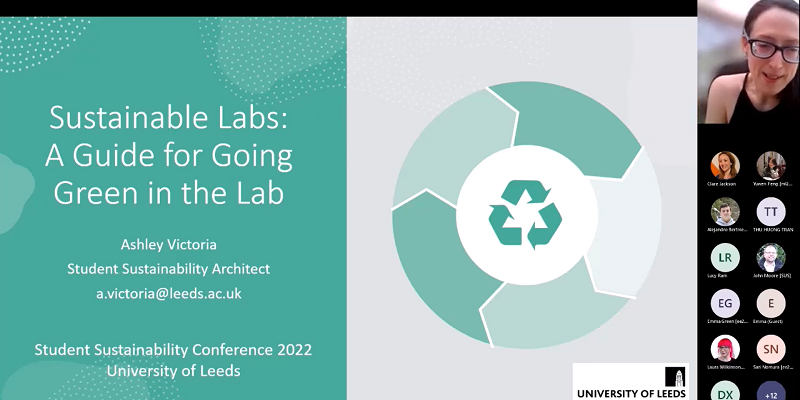Ashley’s experience at the SSRC22

We spoke to Ashley Victoria, one of our Student Sustainability Architects, about her experience presenting at the Student Sustainability Conference 2022 (SSRC22).
Applications to present at the University of Leeds 2023 Student Sustainability Research Conference are NOW OPEN! Submit your application by Sunday 11 December 2022.
How were you involved with the SSRC22?
At the last conference (SSRC22), I delivered a presentation on a project I have been working on in my role as a Student Sustainability Architect. One of the primary aims of the project has been to explore the use of single-use plastics (SUPs) in laboratory spaces across the university, with a view to finding ways to reduce or eliminate their use. This forms part of Sustainable Labs, a key initiative within the University working on promoting and increasing efficiency in lab spaces.
My presentation focused on introducing Sustainable Labs as a whole and the progress made to date, including some hints and tips to help people to make small changes their labs, and plans for the future.
How was the SSRC22 beneficial to you?
The conference was a great opportunity to not only introduce and share the progress of the project, but also provide insight and information on ways we can make small changes to reduce the use of SUPs in lab spaces.
It also gave me the chance to develop my communication skills, particularly within an area that involves the wider university community. Producing a poster as well as a presentation gave me the chance to work on different styles of communication and find engaging ways to get key points across in a poster, without overloading it too much.
Another great benefit of participating in the conference for me was that I was also able to listen to a range of great presentations by other students who shared their research on sustainability topics including climate justice, recycling, transport and more. Sustainability covers such a wide range of themes and with so much representation of these at the conference, I found this a great learning experience for me where I gained greater understanding of key sustainability topics.
Do you have advice for students wanting to take part at the SSRC23?
My advice to anyone keen to present this year would be to consider where your work sits in the wider sustainability remit, for example in relation to the SDGs. Most importantly, make sure your passion and enthusiasm in your work is reflected in your application.
Also, I would recommend attending this conference to anyone directly involved in sustainability research, as well as those that are less familiar and wish to learn more. It’s a great opportunity to expand your network and make new contacts that could lead to further collaboration.
Can you tell us a bit more about your project?
Owing to the nature of laboratory research and the principal need for sterility, accuracy, and experimental reproducibility, the associated environmental impacts can be a huge challenge. There are many different laboratory spaces across the University, each with individual needs and it would be difficult to make bold changes without understanding these needs first. I was keen to understand the diverse requirements of various labs so that a balance could be found that allows sustainable choices to be made, without compromising the quality of the research output.
Laboratory-base activity can be highly resource intensive, contributing to environmental impacts through high energy and water consumption, for example. Another significant impact occurs through the use of consumables and generation of waste. Due to the nature of lab research, much of the waste generated in a lab is destined for incineration at high temperatures. Many lab consumables are made of plastic, intended to be used only once and these are known as SUPs. With a large proportion of consumables being disposed of after one use, there is a significant contribution to the amount of disposed plastic.
Manufacturing plastic also relies on the use of fossil fuels as raw materials and uses a significant amount of energy in the manufacturing process, generating a large carbon footprint. This project, therefore, strongly aligns with SDG 12, Responsible Production and Consumption, and SDG 13, Climate Action.

Applications to present at the University of Leeds 2023 Student Sustainability Research Conference are NOW OPEN! Submit your application by Sunday 11 December 2022.
Keep up to date on the latest news
- Follow us on Twitter: @UoL_Sus
- Follow us on Instagram: @uol_sus
- Follow us on Facebook: @UoLSustainability
- Sign up to our Sustainability newsletter
United Nations Sustainable Development Goals
We use the United Nations Sustainable Development Goals (SDGs) as a framework to guide our activity. Our Sustainable Curriculum work links to the following SDGs:
-
- Goal 4: Quality education
- Goal 13: Climate Action
Find out more about our impact on the SDGs.
